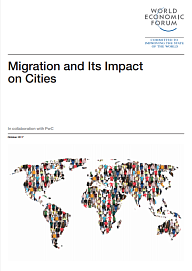Migration is a continuous process that has been the subject of political debate worldwide. People worldwide leave their homelands voluntarily for economic or other reasons, or are forced to leave their homes (as a result of wars, ethnic conflicts, etc.). Managing human mobility is one of the greatest challenges in developed and developing countries. The causes and routes of migration of different types pose difficulties for governments because it is necessary to take into account the causes that forced people to move.
The problem of migration becomes even more significant in cities, since it is there where migrants seek a better life. At the same time, life in cities makes it possible to integrate into society to a larger extent. Cities, in addition, provide a decent level of housing, education, medicine, transport, etc. This report focuses on the state of migration (internal and international, voluntary and involuntary) and attempts to highlight the different types and causes of migration in the world today.
Although the key role of cities as first responders to migration is uncontested, they are in general far from adequately involved in national and international migration decisions. With a high volume of migrants arriving in cities, city leaders are faced with the challenge of providing vital urban infrastructure and services to meet the needs of the migrant population. This includes affordable and social housing, quality education and health services, simple access to basic utilities (water, power, etc.), robust and congestion-free roads and transportation infrastructure as well as, finally, ensuring integration and social cohesion.
22 cities worldwide were analyzed during the survey to capture their stories of migration. Stories from these cities reveal they are under pressure to provide affordable and social housing for their population; the wait time in cities like Paris is over 10 years. The health services of most cities also require new skilled personnel and infrastructure improvements, while the education sector faces challenges related to migrants not speaking the language of the host country.
.png)





